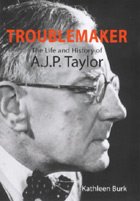 By no stretch of the imagination could A. J. P. Taylor be called a conservative or tory historian. He would have been horrified (or, possibly, amused) by such an idea. A man of the left he was, though how far on the left varied rather.
By no stretch of the imagination could A. J. P. Taylor be called a conservative or tory historian. He would have been horrified (or, possibly, amused) by such an idea. A man of the left he was, though how far on the left varied rather.
He was very proud of the fact that he was the only invited historian at the Communist organized congress at Wroclaw in 1948 to challenge his hosts about history and its writing. On the other hand, he managed to support the Soviet Union in almost all his own writings and never quite managed to understand what Communism meant in reality.
Another thing about Alan (who was, as it happens, Tory Historian’s supervisor at Oxford) was his obsession with mischief-making, though some would call it trouble-making. He was very proud of this and thought this put him in the same category as a number of political and intellectual figures from the past whom he admired. Unfortunately, like all mischief-making, it was not always constructive.
Finally, one must point out the man’s innate conservatism. He came from a better off family than he pretended but saw himself as a representative of that most English sections of the population, the lower middle class.
It is this conservatism or proud Englishness that allowed him, when writing about Keith Feiling’s “A History of England”, to sympathize with the squierarchy, the bastion of Toryism:
“Toryism starts with the squire, the lesser landowner. Everyone knows that. Feiling emphasises again and again the permanent elements in rural society. He recognizes, as few Whig historians have done, the importance of local government; indeed even parliament bulks largest in his eyes as a gathering of country gentry. The traditional ‘liberties of England’ rested on law and custom, not on rational dogma, and the man who maintained them, as in Poland or Hungary, was the country squire. He maintained them no doubt for his own profit and advantage, a point which Feiling is inclined to slide over; still England would not be a free country without him.”The review, first published in 1950 and reprinted in the Penguin “Essays in English History” is of some interest, not least because of the assumptions of his time. Taylor seemed to assume that the Labour government was there to stay, that Conservatives were no more than a sizeable minority of the country (he does not specify what the other parties and their followers are) and deeply dislikeable. All this in 1950 just before a largely Conservative ruled half century set in.
The most interesting part is Taylor’s attempt to define Tory history. At first, he describes it as the Whig history without the ideas – Tories, in his opinion, being basically and deliberately inimical to ideas.
Then he goes further and comes up with an interesting definition. The Tories eventually accepted the 1688 agreement and, as the concept of devotion to the Crown and the Church of England gradually changed beyond what could be reasonably seen as Toryism, so the latter became the party of administration rather than ideology.
“If by Liberalism is meant all those who try to apply reason to politics, and who enter politics in order to improve things, then it is only tory landowners who are on the other side. Conservatism becomes the party also of those who are in politics simply to make things work: to promote, no doubt, their own careers, but to promote it by public service.”Like so many of Taylor’s ideas, this one sounds seductive, too. But it leaves out very many things, not least the notion that public service and its importance are also application of reason. It ignores or fails to perceive the flexibility of Conservative thinking and its ability to assimilate other ideas.
“Thus what may be called the Tory interpretation of history has no longer much to do with high-flown loyalty to the Crown or devotion to the Church of England: it is not even the exaltation of traditional institutions. The tory spirit in history is shown by an emphasis on administration, by getting ideas out of history and putting humdrum personal motvies and office routine in.”
Above all, and this is the strangest of all, it seems to ignore the growing importance of Socialist history and Conservatism becoming its alternative. (Well, sometimes.)
The first page of Taylor's English History is the best evocation of pre-Great War freedom that I know of. The English have a category of people who are politically socialistic yet to one degree or another have a conservative style and sensibility. Taylor is one, Orwell is another.
With one enormous difference between them: Orwell understood communism.